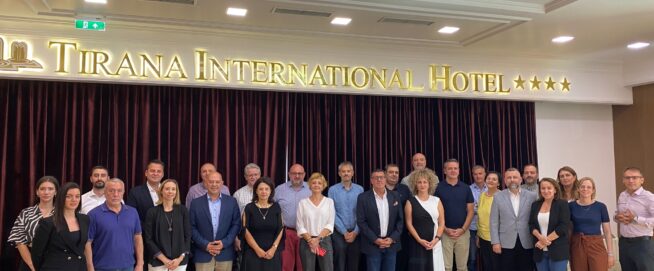
News
 Tirana, Albania
Tirana, Albania KOSOVO AND SERBIA MPs DISCUSS IMPLEMENTING AGREEMENTS

Bilateral disputes between Kosovo and Serbia harm their EU integration prospects and have repercussions for the region’s stability. The high level of mistrust between the parties and their increasing skepticism towards the EU as a mediator reflect mutual reluctance to implement previous agreements. Given that Kosovo and Serbia are unlikely to conclude the ongoing disputes on their own, the EU and the US could step up their efforts as stakeholders and negotiate separately with each country.
With the geopolitical threat on the horizon due to the war in Ukraine and the possibility of a spillover effect to the Western Balkans, the reconciliation between Kosovo and Serbia is of crucial importance to the EU. The EU should be proactive in its enlargement policy towards the region and offer a clear date for accession. This might incentivize both Serbia and Kosovo to behave like EU aspiring countries, negotiating in harmony with, not oppose to EU standards. The countries’ leaderships, on the other hand, need to fully implement what they agreed in Brussels and Ohrid, not because these reforms are required by the EU but because they benefit the people of both countries. “We need leaders that take ownership in the dialogue, because at the end of our day, it is our job to take care of our home.” The EU should level up its approach to the existing circumstances and provide a clear dissemination plan of the Pristina-Belgrade dialogue. Ultimately, the reconciliation between Kosovo and Serbia and the stability in the region are pieces of a much more complex mosaic: the political influence of the “West vs. East.”
To discuss the current state of affairs, the Council for Inclusive Governance (CIG) convened a roundtable on September 23, 2023, in Tirana, Albania, for senior politicians, both current and former members of parliaments from Serbia and Kosovo, as well as political analysts. The participants discussed ways of pushing forward the normalization process between Kosovo and Serbia and explored measures that both countries could implement to normalize the bilateral relations. This roundtable was organized in cooperation with the Swiss Federal Department of Foreign Affairs (FDFA). The discussion took place under the Chatham House Rule, ensuring the confidentiality of the participants’ remarks. Therefore, this report should be regarded as a collective summary of the conversation and it does not necessarily represent the views of individual participants, CIG, or FDFA. Gresa Baftiu, CIG’s associate in Kosovo, prepared the report accessible through the link below.








